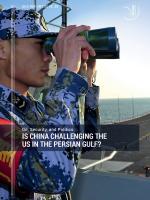China's growing interest in the Persian Gulf
In this new report DIIS researchers Yang Jiang and Lars Erslev Andersen explore the changing strategic roles of the USA and China in the Persian Gulf region, in particular in view of US (mis)handling of local conflicts and China’s expanding economic interest there, in order to identify the implications for Danish Middle East Policy.
While the US has provided thesecurity umbrella in the region, its handling of ethnic conflicts and civil wars hasirritated members of the Gulf Cooperation Council (GCC). Political developments,including 9/11 and the Arab Spring, have forced the member states of the GCC to take action to avoid the spread of democratic movements and reforms, whileseeking to handle their own affairs without interference from the US, EU and UN.Problems in GCC–US relations also make GCC states look Eastwards for newpartners, providing a power vacuum and opportunity for China to edge in.
China has expanding economic involvement in the Gulf and has overtaken the US as the biggest importer of oil from the GCC. With expanding trade, investment and contract work in the Gulf, China seeks to protect its assets and citizens there. It can no longer follow the old diplomatic strategy of keeping a low profile and keeping business and politics separate. China has learned from crises in Libya and Sudan and changed its policy from non-intervention to active mediation, supporting UN sanctions, contributing to UN peacekeeping missions and securing peacekeeping to protect its oil interests.
Doubts remain both within the GCC and in Chinese policymaking circles as to what extent China should be strategically involved in the Gulf, and China does not seek to challenge or replace the US as the security provider of the Middle East. However, there is no doubt that active pragmatism has become China’s guiding diplomatic strategy and that we will see more political and strategic activities from China in the region.
This report presents the following recommendations for Danish foreign policy in the Persian Gulf and more broadly in the Middle East:
- Recognise that China will increase both its economic and political presence inthe Gulf, with a potential expansion of military presence through UN peacekeepingmissions.
- Involve China in multilateral dialogues in order to establish norms and codes ofconduct both for companies and for political entities in the region.
- In Denmark’s relation with the GCC, it should establish dialogue with Chinaconcerning oil and conflicts in the Persian Gulf.
- Denmark and Western countries can use the commercial interests of Chinesecompanies in other parts of the world as bargaining chips to negotiate matters inthe Gulf.
DIIS Experts




